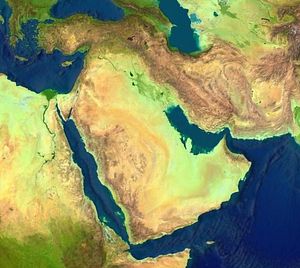As the United States enters the Trump era, the war of words is heating up between China and the new president. Trump’s open criticism of China’s as a “currency manipulator,” his challenge to the “one China Policy,” and threatening comments on the South China Sea all make the future of China-U.S. relations under the Trump administration seem less than encouraging.
Although most Chinese scholars believe that Trump’s impact will be limited by the U.S. system, which is heavy on professional advisors, the risk of China-US relation deterioration should not be underestimated. Importantly, the impact of President Trump on China will also extend far beyond the Asia-Pacific. The deterioration of U.S.-China relations may pose a new challenge to China’s policy and interests in Middle East.
China’s Middle East policy is largely influenced by domestic ideology and the current political leader’s personal decisions. From 1949 to the mid-1970s, when Mao Zedong dominated the state, China sought to distance itself from the “colonialist/imperialist West” and viewed itself as the “guardian of revolution” in the world, including in the Middle East. Even when China was beset by social chaos and tremendous economic difficulties resulting from the Great Leap Forward in the late 1950s and the Cultural Revolution from 1966 to 1976, China still fully supported the Palestine Liberation Organization (PLO) through both diplomatic statements and military aid.
After Deng Xiaoping assumed power in 1978, China started to focus on economic development while downplaying ideological conflicts in international arena. Accelerated economic growth has been China’s chief concern since the 1980s. In this context, the increased need for imported oil, China’s commercial relations with Middle East nations, and a sense of inferiority compared to the United States all strengthened China’s non-interference policy, which holds that no state has the right to interfere in the internal affairs of another state. This policy has allowed China to continue economic activity and develop good relations with different nations, including in the Middle East.
After Xi Jinping assumed power in 2012, China started to focus more on the “knowledge economy” and is determined to transfer China’s economic foundation from “made in China” to “innovated in China.” The transformation of development strategy partly results from Xi’s previous experience; the provinces Xi led, such as Zhejiang and Fujian, before being elected into the Communist Party’s Central Committee, were China’s richest provinces and home to many leading Chinese high-tech R&D industries. Against this backdrop, Xi hopes to copy his experience in Zhejiang province as the model to encourage China’s high-tech economy, and to export China’s economic advantages to foreign states, especially states in the Middle East, Central Asia, Africa, and South America.
A key part of that strategy will be to strengthen China’s relations with all the states along the “One Belt, One Road” (OBOR) track. China has promoted OBOR aggressively through building railways, roads, ports, and highways through South and Central Asia as well as the Middle East and Eastern Europe.
However, China’s Middle Eastern interests may face new challenges in the Trump era. China may have to take more responsibility in the Middle East. Although China criticizes the U.S. presence in the Middle East as “intervention,” China actually benefits from U.S. hegemony in the Middle East, which provides stability and safe shipping routes for the oil China so desperately needs, without China having to make any significant investment in safeguarding the area. In fact, at one point, former U.S. President Barack Obama referred to China as a “free rider” that leaves the United States to tackle problems without doing much to help.
Beijing has traditionally preferred the promotion of trade and investment to significant diplomatic activity, foreign aid, and certainly military involvement. Accordingly, although its economic involvement in the Middle East has grown over the last decade, its military and security involvement remains marginal. However, the volatile situation the Middle East, which has grown worse since 2011 thanks to regional upheavals and the collapse of states such as Libya, Syria, Iraq, and Yemen, poses serious challenges to Beijing and its regional policy. Instability and violence in the Middle East are a direct threat to the safety of Chinese investments, to the flow of resources (imports of oil and raw materials and exports of consumer goods), and to the safety of Chinese citizens working in those states. Given Trump’s “America First” slogan, China may have to increase its presence, both political and military, in the Middle East to protect its increasing interests in this region. However, China has yet to accumulate experience in projecting military might by means of executing complex military operations or maintaining military bases overseas. More involvement by China on security issues may harm its “positive image” and soft power in Middle East.
Meanwhile, under President Trump, the distrust between China and the United States may escalate significantly, especially given his provocative remarks over the trade issues, the one China policy, and the South China Sea. Should U.S.-China tensions rise, Middle East states may face a difficult choice in deciding whom to support.
It is safe to assume that China’s interests will continue expand in Middle East, and the position of the Middle East in Chinese diplomacy will blossom with the progress of the “One Belt, One Road” initiative. Yet between Trump’s “America First” isolationism and the likelihood of worsened bilateral relations between China and the United States, China’s policy and interests in the Middle East may face challenges in the future.
Wang Jin is a Ph.D. Candidate at the School of Political Science, University of Haifa, Israel.

































